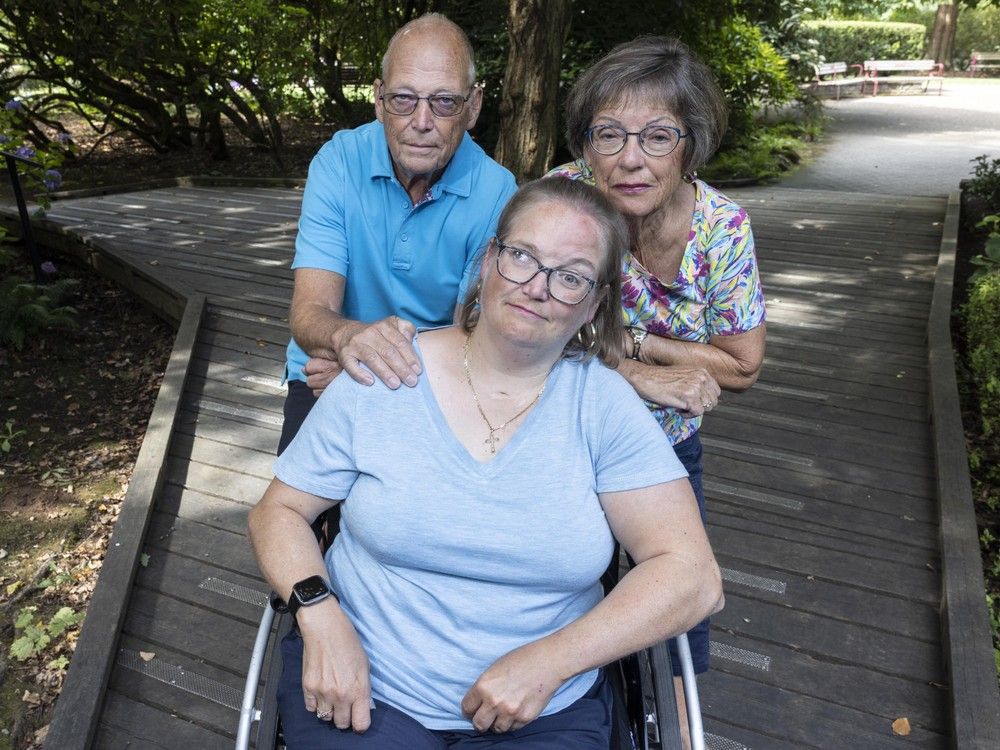Article content It has been over 30 years since Jim and Colleen Henderson’s 25th wedding anniversary trip to Hawaii was cut short by a call telling them their three daughters had been in a car crash in Maple Ridge while heading home from a friend’s house. Tricia, 20, was killed. Krista, 18, had a broken leg and deep cuts to her right arm.
Carla, 15, spent 90 days in a coma, followed by two years in hospital for rehab. The Langley couple are now struggling to find a forever home for Carla, who was left with visual impairment, short-term memory loss and extreme physical impairments. She requires round-the-clock supervision.

Since 2010, Carla had been living at the South House group home for brain injuries in Langley operated by Connect Communities. But earlier this year, Jim and Colleen had to move her after the for-profit company raised their rates from $260 to $500 a day. The couple said a structured settlement from ICBC allowed them to pay for private care for their daughter for years, but the new rates were more than they could afford.
“Carla had enough money, after she lived at home for 17 years, to be able to afford to go there. She lived there for almost 13 years and at the end we were paying $260 a day,” said Jim Henderson, who noted that in 2019, their initial rate of $225 a day had been increased 16 per cent. “My letter back to them at the time was you should raise the rate every year so that just doesn’t happen, because it’s always culture shock.
You go for four or five or six years with no increase, and then suddenly somebody slams a heavy increase at you.” He also said he had concerns that Carla was getting little more than room and board, with the standards of care falling in recent years. Emails between him and Jamie Curran, Connect Communities director of people, culture and services, in August and September 2023, show Curran was willing to gradually impose the new price over several months, but the increase to $500 a day was non-negotiable.
Concerns were also expressed that Carla’s physical condition was failing because of a lack of therapy sessions with staff. The company said the frequency of physical activities depended on how Carla was feeling. Connect Communities CEO Patti Flaherty said that the family’s starting rate of $225 a day was well below the per diem from their structured settlement with ICBC, but acknowledged it is on the company for not having a gradual rate increase over several years.
Nevertheless, she said the $260 a day rate that the Hendersons were paying by 2023 was unaffordable for Connect, given the rising costs of staff and equipment. “We needed to figure out a way to get to a place where it was sustainable and so we were working with them to figure out a way forward to get us there with time,” said Flaherty, who said she was heartbroken about Carla’s move but understands it was the only option. “They absolutely couldn’t afford to stay where we are and they needed to do what they needed to do.
I completely understand and respect that and I’m sure it was a very difficult decision for them.” The Hendersons appealed to Fraser Health, local NDP MLA Megan Dykeman and the Public Guardian and Trustee of B.C.
for help but were told that because Connect Communities is private, there was little the health authority or provincial government can do to help. Dykeman’s constituency assistant, Carly Haugen, suggested the couple to reach out to Fraser Health’s acquired brain injury program to assess Carla’s suitability for subsidized care. The problem, the Hendersons said, is that because they have third-party funding through ICBC, the health authority refused to provide any support.
An intake form from the acquired brain injury program said Carla doesn’t qualify for support given she has her own funding. “Nobody that looked after the health-care system, as far as the government is concerned, really cared whether you had $10 worth of funding or $100,000. As soon as you said you had funding, they’d say, ‘Oh, sorry, we can’t help you,'” Jim Henderson said.
He said he asked Fraser Health what the average day rate for a public assisted-living bed was so he could get a sense of what a reasonable increase by Connect Communities would be, but was not given an answer, later being told by a health authority employee that the rate for health-authority subsidized public beds at Connect is $340 a day. In a statement Thursday, Fraser Health said it had reached out to the family to “understand their situation and ensure they have the information they need on next steps in their care.” It said that under a recent announcement from ICBC and the provincial government, claims made after May 2021 are eligible for certain home and community care services, “with Medical Services Plan being the first payer.
” Eligible individuals can use their third-party funding to receive those government services. But, if third-party funding was established before May 2021, as in the Henderson’s case, that funding “may not be used to access subsidized assisted living or long-term care services.” Once a person has exhausted their ICBC settlement, though, “they may be eligible to apply for Fraser Health assisted living or long-term care services.
” Janelle Breese Biagoni, founder and CEO of B.C. Consensus on Brain Injury, a think-tank focused on raising awareness about and find solutions to the impacts of brain trauma, said she has known thd Hendersons for several years and the issues they are raising about a lack of government support in cases where a family has third-party funding is not unique.
“Just because you get third-party funding, that doesn’t mean your third-party funder is going to pay for everything or even just the services that you need,” said Biagoni, stating she believes the government nevertheless thinks third-party funding will pay for everything a patient needs. Cost increases and reduced care hours at for-profit care facilities have been a recurring problem. Last month, Dan Levitt, B.
C.’s seniors advocate, reported his office has been inundated with complaints that rents in private assisted-living and long-term care facilities are being raised as much as 24 per cent. Last September, Levitt’s predecessor, Isobel Mackenzie, also found for-profit long-term care facilities were providing 500,000 fewer care hours than what they were being paid for by government.
At the end of the day, Jim Henderson says he just wants to be able to afford a place for Carla that gives her the support she needs and deserves. “The bottom line is it has to be affordable, and it has to help people with a brain injury, regardless of how they got their brain injury,” he said. “The place also has to have enough staff to be able to support the people that are there.
”.



















